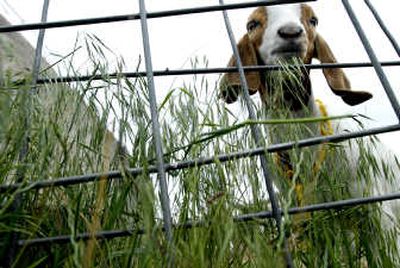Rid your garden of weeds

“If you’re going to have a garden, you should know something about weeds and how to handle them.”
That’s Don McCandless’ philosophy. A Master Gardener for nine years, and owner of Don’s Greenhouse in Cheney, McCandless has plenty of weed experience.
“Well, I’m not an expert, I don’t think,” says McCandless. “But I know weeds. We studied a lot of weeds and had to identify them in the Master Gardener program.”
He and his wife LaVerle were one of the first husband-and-wife teams to take the Master Gardener course together at Washington State University. They got their first greenhouse 22 years ago, and at one time had three greenhouses, growing and selling flowers. Now they’ve downsized to two greenhouses and sell vegetables only. They also do a lot of canning, drying and freezing, have four beehives and raise goats.
Their one-acre garden is completely organic, although they are not certified. They didn’t have the soil tested and go through costly inspections. They didn’t think that was economically feasible for their small plot, but they are allowed to say everything is “organically grown.”
They also use organic methods for killing weeds.
“There’s five percent vinegar,” says McCandless. “You can use boiling water; or burn them with a butane tank. Of course there is the mechanical device – digging them up. For bigger plots, rather than urban, you can use goats. We have a portable fence we move around, and in a couple of days the goats have the weeds under control. They’ll just eat and eat and eat. We call them palate machines.”
Native weeds aren’t so harmful, as they have native insects to control them. It’s the non-native weeds that can take over, as they have no natural enemies here.
McCandless says there are plenty of noxious weeds in this area. Dalmatian toadflax, with its snapdragon appearance, was brought to this country as an ornamental from the Mediterranean. Field bindweed, from Eurasia, was also sold as an ornamental in the U.S. in the early 1800s. Russian knapweed is from the sunflower family, and came to North America through alfalfa seed brought in from Turkestan around 1900. European immigrants brought dandelions for a green in salads or to make wine.
How important is it, really, to keep your property noxious weed-free?
“It’s the law,” says McCandless. “There is a Noxious Weed Control Board. You’re supposed to spray any weed classified as noxious. The county will come out and check. If you don’t get rid of the weeds yourself, they’ll charge you.”
Sound daunting? LaVerle shares a secret learned in the Master Gardner program.
“If you can get your whole garden, whether it’s vegetable or flower, all weeded one time before the Fourth of July, then you won’t have many weeds after that,” says LaVerle. “Then just little ones come up and it’s really easy to keep it clean.”
The important thing, the couple say, is to destroy the weeds before they go to seed. Mowed weeds can’t be subject to fines, as they can’t seed. If the weeds don’t have time to mature, they can’t propagate the species. A good practice for larger properties is to section off a small parcel, dig up the weeds, and then plant groundcover. Mow the remainder, and when the plants grow back, repeat this strategy. But check the grasses first to see if there are any inhabitants.
“Oh, yes, I’ll hire a mower and mow everything down,” says McCandless. “But I’m not going to for awhile because there’s quail nesting in there. So I’ll wait and let them hatch.”
McCandless has judged vegetables at the Spokane Interstate County Fair for more than 20 years. He also exhibits his own produce, and has won many blue ribbons, including a Best of Show for garlic.
The McCandless’ both retired 15 years ago, and enjoy life on their little farm.
“We try to balance everything,” says McCandless. “We have organic compost. We have plants in the greenhouse for our own use. The bees are for pollinating the garden. And the goats take all the excess from the garden.”